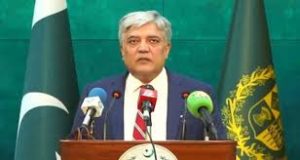Islamophobia commemoration at UN sent ‘powerful’ message of global unity against phenomenon: Bilawal Bhutto

United Nations: Foreign Minister Bilawal Bhutto Zardari has wrapped up his 5-day visit to New York, saying that the first-ever commemoration of the International Day to Combat Islamophobia at the UN sent a “very powerful” message of global unity against the “poison” of Islamophobia.
At the same time, the foreign minister told a press conference that Wednesday’s “Women in Islam” event, which he also presided, reflected Islamic countries’ commitment to the empowerment of women and gender parity.
“We were unanimous that women have a right to education and those depriving their rights are actually doing so in direct conflict with the religion of Islam,” he said.
Both events turned the international spotlight on Pakistan as it continues to play a positive role despite a host of challenges it faces.
FM Bilawal said it was evident from Friday’s discussion that the growing phenomenon of Islamophobia should be called out and tackled at every step to create more inclusive and safe spaces for Muslims at individual, community and institutional levels.
The meeting on Islamophobia was co-convened by the President of the General Assembly, Casaba Korosi, and FM Bilawal as the Chair of the Organization of Islamic Cooperation (OIC) Council of Foreign Ministers.
Last year, the 193-member Assembly adopted resolution 76/254 designating March 15 as the International Day to Combat Islamophobia.
The foreign minister said the world must realize that perpetuating discrimination, hostility and violence towards Muslim individuals and communities, undercuts the ability of affected Muslims to be Muslims and violates their basic rights and fundamental freedoms.
Replying to a question, he said Pakistan believes that continuing engagement with the Afghan interim government was the best means to achieve the international community’s objectives for the observance of human rights, especially women’s rights, inclusive governance, and an end to terrorism within and from Afghanistan.
It was also in Pakistan’s interest that there is a peaceful, prosperous, stable, secure Afghanistan, at peace with itself and with its neighbours, he said.
“it is also in our interest that the Afghan interim government delivers on their commitments to their people and to the international community,” FM Bilawal said, adding that if they fail to do, the Afghan people will continue to suffer.
The second victims of such a failure will be the Pakistani people, if they fail to live up to their commitment to ensure that their soil is not used for terrorism, noting the increasing number of terrorist attacks in Pakistan.
To another question, FM Bilawal said that Kashmir and Palestine remain unaddressed by the United Nations. “We would like to see an extra focus not only on Palestine, but also on Kashmir.”
Pakistan, he said, faces a particularly uphill task to try and get the Kashmir into the center of the agenda of the United Nations, as India objects vociferously, claiming it is not a disputed territory and that it is an internal matter and that its usurpation should be endorsed.
“So while we do find it difficult to get the truth across, we are persistent in our efforts,” the foreign minister said, adding at every opportunity, be it at the UN Security Council or at various events, Pakistan raises the issues of Kashmir and Palestine.
Responding to a question, FM Bilawal said Pakistan will not recognize Israel until the Palestinians have attain their rights, calling it an apartheid state .
To another question, he warmly welcomed the normalization of diplomatic relations between Saudi Arabia and Iran, facilitated by China.
“This diplomatic breakthrough will instill confidence and trust and contribute to peace and stability in region, which speaks of the positive leadership of China on the world stage – their attempts to promote unity, win-win cooperation and dispute resolution,” FM Bilawal said.





